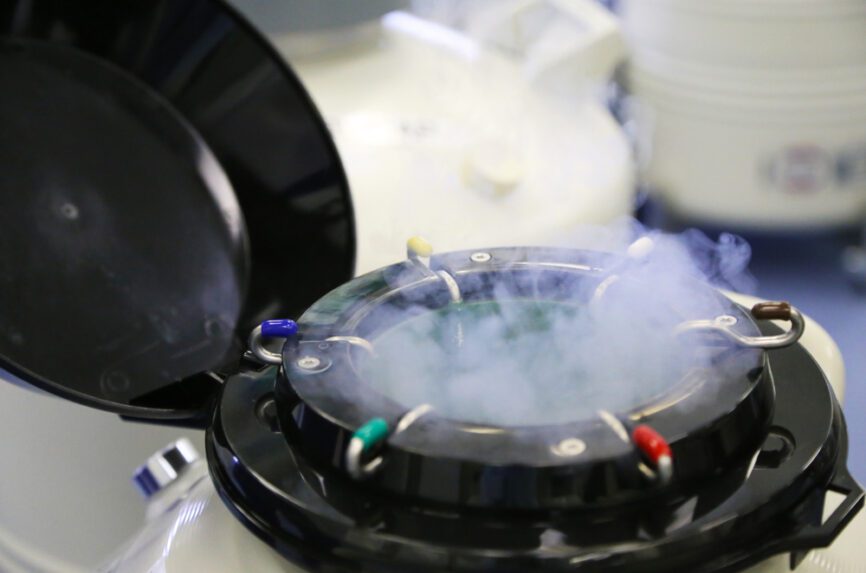Bioethics Forum Essay
Fetal Personhood, IVF, and the Negligent Loss of Embryos
On February 16, the Supreme Court of Alabama held that two couples were eligible to recover damages for the loss of their frozen embryos. This was not the first time people have sued fertility clinics for negligence leading to the loss of their embryos–over 130 lawsuits have been filed since 2009–but it was the first decision since Dobbs overturned Roe v. Wade. Essentially, the decision said that since embryos are children/persons under Alabama law, and individuals have been able to recover damages for the loss of a fetus, they should also be able to recover for the loss of extracorporeal embryos. In the words of the majority, Alabama’s Wrongful Death of a Minor Act “applies to all children, born and unborn, without limitation. It is not the role of this Court to craft a new limitation based on our own view of what is or is not wise public policy. That is especially true where, as here, the People of this State have adopted a Constitutional amendment directly aimed at stopping courts from excluding ‘unborn life’ from legal protection.”
Soon after the ruling, three fertility clinics in Alabama suspended IVF treatment because of questions about the legal risks it posed to them. Following a national uproar over the implications for IVF and people who depend on it to start families, Alabama’s House and Senate passed bills on February 29 that would shield doctors, clinics, and hospitals from possible liability. A similar approach was taken by Republican lawmakers in Florida, who decided to pause their attempt to allow civil lawsuits over the wrongful death of a fetus after being warned by Democratic lawmakers and others that the bill amounts to “fetal personhood,” which could imperil doctors who assisted women in obtaining an abortion, as well as adversely affecting fertility treatments.
Lost in the extensive media coverage that followed the Alabama Supreme Court ruling is the legal and ethical issue of wrongful death of a child, a fetus, or a frozen embryo. Wrongful death suits give legal redress to prospective parents who lose a child or potential child through medical negligence. It recognizes that their grief is real and deserving of compensation. However, wrongful death suits can only be brought for the death of a person and endowing embryos as persons or children threatens IVF. The problem is this: How can the legitimate concerns of fertility patients whose embryos are negligently lost be addressed without threatening the very existence of IVF?
One could be forgiven for thinking that the Alabama Supreme Court had endowed extracorporeal embryos with a new legal status–that of child or person. However, it was not the Court that endowed embryos with legal personhood in Alabama, but the Legislature. Moreover, the decision concerned the right of recovery in wrongful death suits, not the practice of IVF, and wrongful death suits give rights not to children but to parents who have suffered emotional harm from the loss of their child.
Some commentators made the misleading claim that the Court’s decision was based on a law dating from 1872, 100 years before the development of IVF. It is true that the Court held that embryos fell within the Wrongful Death Act of a Minor, but this was based on more recent judicial decisions (here and here) that expanded recovery to fetuses. Originally, wrongful death actions were limited to financial damages because their purpose was to compensate the victim’s survivors for their loss of income. This meant that there could be no recovery even for born children. This changed over the years, with the recognition that parents suffer emotional harm from the loss of a child and that the loss of a fetus, especially after viability, can be just as emotionally devastating to the prospective parents as the loss of a born child. (See, for example, Moen v. Hanson, 85 Wn.2d 5987, 537 P.2d 266 (1975).)
If couples who lose a fetus through medical negligence have a legal remedy, why not couples going through infertility treatment? Surely, their loss and grief should be recognized, and they should not be denied a legal remedy.
Understanding the legal context is crucial because success in a wrongful death suit depends on demonstrating that the death is the result of negligence. In the Alabama Supreme Court case, the evidence of negligence was overwhelming. A patient in the hospital managed to wander into the fertility clinic through an unsecured doorway and enter the facility where frozen embryos were stored. The patient removed several embryos and then dropped them on the floor, causing their deaths. If that isn’t negligence on the part of the clinic, I don’t know what is.
Allowing prospective parents to recover damages for the negligent loss of embryos does not, by itself, threaten IVF. There is no negligence when IVF is done with the informed consent of patients, in accord with prevailing medical standards. No negligence, no recovery for wrongful death. So, was the outcry from some providers and clinics an overreaction? The fear is that calling embryos children or persons endangers standard practices in that IVF routinely involves discarding frozen embryos.
The reason for the creation and discarding of surplus embryos in IVF is twofold. First, freezing extra embryos gives the individual or couple the best chance of a successful pregnancy, without multiple births, which are riskier for mother and babies, and without the need for additional cycles of egg retrieval, which impose significant physical burdens on the woman, as well as costs. Second, the creation of extra embryos enables the testing and discarding of embryos with chromosomal defects. Defective embryos are less likely to implant, so preimplantation testing improves the chances of a successful pregnancy, as well as preventing the birth of a child with a serious disabling condition.
Can these practices be justified if embryos are legal persons? How can it be legal to kill persons simply because they aren’t needed or have defects? One might reconcile the decision of the Alabama Supreme Court with IVF by keeping in mind that the decision applied only to recovery in wrongful death suits. However, the decision then went on for pages discussing the sanctity of life in specifically Christian terms of dubious legal relevance. That is legitimate cause for concern because it suggests that the aim was not simply to give a remedy to victims of negligence, but rather to impose a particular religious view of the status of embryos. Moreover, at times the decision strongly suggests that discarding embryos is forbidden. For example, Chief Justice Tom Parker wrote, “Even before birth, all human beings have the image of God, and their lives cannot be destroyed without effacing his glory.” Although this sentence is not strictly part of the Court’s opinion, but appears only in a concurring opinion, it is enough to create anxiety among fertility medicine practitioners, who wonder whether discarding embryos exposes them to civil or even criminal liability.
So, how should states treat the negligent loss of embryos? There are several options. One is to deny fertility patients any legal recourse, but that seems manifestly unjust. Another approach is to allow them to sue negligent providers and be compensated for the loss of their property. But this approach is also inadequate. It treats embryos like furniture, instead of potential children which have a significance and value that goes beyond that of mere objects or possessions. A third option is to endow embryos with the legal status of persons, but to restrict this to wrongful death suits. This was the approach of lawmakers in Alabama and Florida following the Alabama Supreme Court ruling.
Legally, there is nothing wrong with regarding embryos and fetuses as persons for the purpose of wrongful death suits, while not endowing them with that status in other areas of the law. However, recovery in wrongful death suits leaves some people scratching their heads. “You mean, if embryos are killed through negligence, that’s against the law, but it’s perfectly OK to kill embryos — that is, children — deliberately? How can that be?”
Fortunately, there is a better solution for compensating those who suffer the loss of their frozen embryos: the creation of a new tort of reproductive negligence. This approach, suggested by a few scholars (for example, Dov Fox, “Reproductive Negligence,”) would allow recovery for lost embryos due to negligence, but could also apply to the negligent or reckless destruction of frozen sperm or eggs, as well as medical negligence that renders individuals infertile. In all these cases, the harm is the deprivation of the ability to become a biological parent. Such a tort has the advantage of acknowledging that this loss is significant and deserves legal redress, without the risk of the personhood approach, which could deprive infertile people of the medical assistance they need to have children. Creating a new tort would be complex, but given the injustice of denying recovery completely, the inadequacy of treating frozen embryos, eggs, or sperm as mere property, and the dangers of the personhood approach, it seems to be the best solution.
Bonnie Steinbock, PhD, is professor emerita of philosophy at the University at Albany, State University of New York, and a Hastings Center fellow.













This is one of the very few commentaries on the Alabama ruling that accurately reflects what the Court decided. Unfortunately, the Legislature and Governor Ivey overreacted and precluded any recovery (under wrongful death or otherwise) for aggrieved parents whose embryonic children are destroyed through negligence or malfeasance. Moreover, the legislation as enacted puts a ridiculously low damages cap on lawsuits — such as those being prosecuted in several states against Cooper Surgical for its defective product that killed embryos in vitro. The article’s suggestion that parents can still recover (perhaps I’ve misread Dr Steinbock’s analysis) seems misplaced. Finally, while there is great merit to Dr Steinbock’s defense of the rights of aggrieved parents to recover, her conclusion ultimately stumbles on the question of the ontological status of the embryo: does the value of an embryo ultimately depend on the value given to the embryo by its parents? Or does the embryo have an intrinsic value that the law is obligated to protect? Other developed countries have treated this question far more seriously than the USA, imposing restrictions on IVF that result in far less “spare” embryos being created and potentially subject to destruction. Having said all this, thanks to Dr Steinbock for trying to calm the agita that the IVF industry and a compliant media instigated after the Court’s ruling.